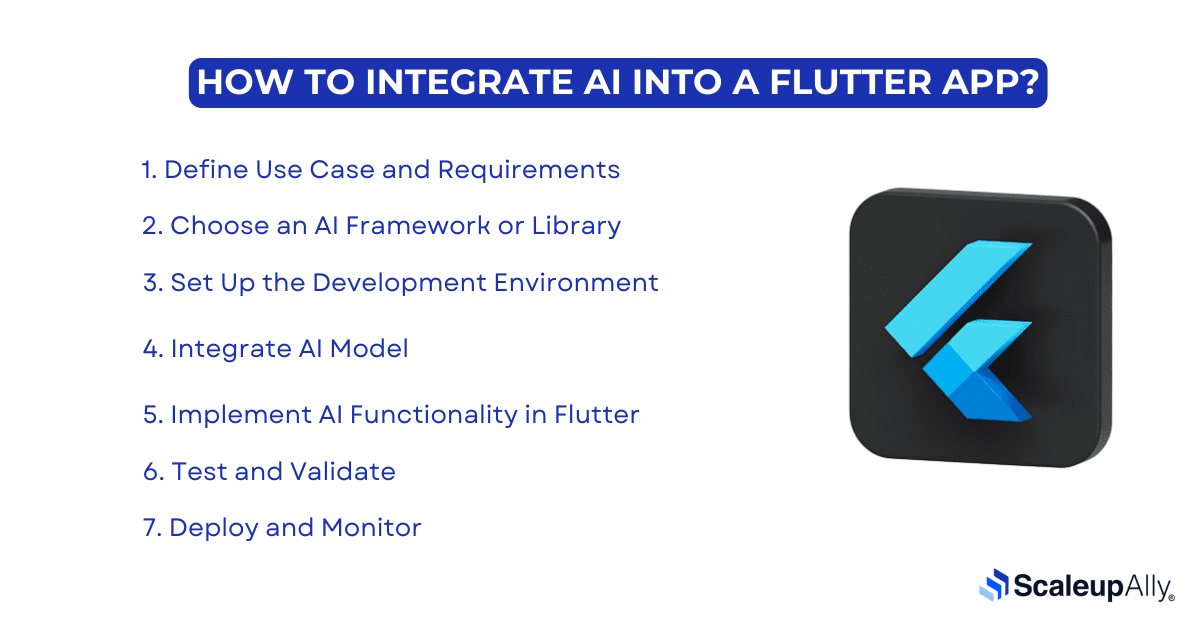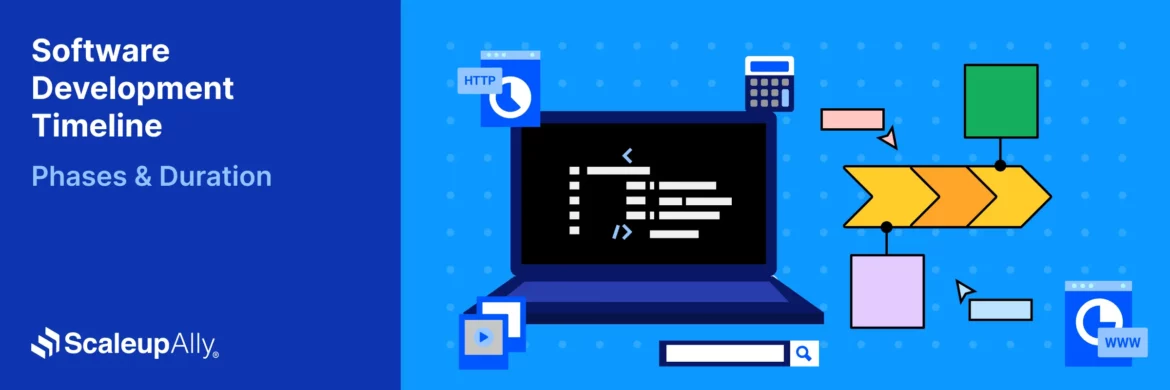
Flutter AI Integration: How to Integrate AI into a Flutter App?
Suprabhat Sen | November 28, 2024 , 14 min read
Table Of Content
Have you ever thought of a Flutter app that can understand your needs, respond to your requests naturally, and even anticipate your next move? This isn’t science fiction; it’s a possibility made by integrating AI in Flutter apps.
This blog post will be your guide to Flutter AI integration. We’ll explore the different ways you can integrate apps made using Flutter with AI, the benefits it offers, and the tools available to make the process smooth.
Let’s get started!
Key Takeaways
- Flutter AI integration empowers apps to analyse user behaviour, providing personalised experiences and intelligent interactions that increase engagement.
- By embedding machine learning, Flutter apps can automate repetitive tasks, enhance decision-making, and improve overall operational efficiency.
- Advanced AI features like voice recognition, image classification, and predictive analytics make apps smarter, more intuitive, and highly adaptive.
- Developers can leverage frameworks like TensorFlow Lite, ML Kit, or IBM Watson to seamlessly integrate AI while maintaining robust app performance.
- AI-driven Flutter apps open new business opportunities through personalized recommendations, predictive insights, and innovative features that delight users.
What is Flutter AI Integration?
- What is Flutter AI Integration?
- Why Integrate AI in Flutter Apps?
- Benefits of Flutter AI Integration
- How to Integrate AI into a Flutter App?
- Popular AI Frameworks for Flutter
- 3 Key Challenges of Integrating AI in Flutter Apps
- Real-World Examples of AI in Flutter Apps
- 10 Use Cases of Flutter AI Integration in Different Industries
- Conclusion
- Frequently Asked Questions
Flutter AI Integration involves embedding artificial intelligence (AI) and machine learning (ML) capabilities into Flutter applications to meticulously improve their functionality. This integration supports features like voice recognition, image classification, predictive analytics, and personalized user experiences.
If one can harness tools like TensorFlow Lite, Firebase ML, or third-party AI APIs, Flutter lets developers seamlessly incorporate advanced AI models, making apps smarter and more intuitive.
Why Integrate AI in Flutter Apps?
Integrating AI in Flutter apps enhances functionality by leveraging machine learning algorithms. This helps create personalized experiences for users and makes app operations smoother. AI features can study how users behave, predict what they might like, and automate tasks, which makes apps more engaging and efficient.
When developers integrate AI in Flutter, they can harness powerful libraries like TensorFlow Lite or ML Kit to implement advanced capabilities such as image recognition, natural language processing, and recommendation systems seamlessly into their applications, catering to user expectations and enhancing overall app performance.
Benefits of Flutter AI Integration
The fusion of flutter and ai has ushered in a new era of possibilities and benefits in mobile app development.
Here are some of the standout advantages that AI brings to the table:
1. Improved user experience
- Personalization: AI algorithms analyse user behaviour and preferences to create tailor-made experiences. Whether it’s recommending a song, suggesting a product, or even adjusting the app’s interface, AI ensures that the app resonates with individual users.
- Intelligent interactions: Features like chatbots and voice assistants powered by AI provide seamless and intuitive interactions, making the app feel more human-like and engaging.
- Predictive analytics: AI can predict user needs and provide solutions even before the user asks. This proactive approach enhances user satisfaction and creates a more efficient user journey.
2. Increased productivity
- Automation: AI can automate repetitive and time-consuming tasks, allowing developers and businesses to focus on more critical aspects. From customer support to data analysis, automation speeds up processes and enhances efficiency.
- Real-time decision-making: AI’s ability to analyse vast amounts of data in real-time enables quicker and more informed decision-making. Whether it’s adjusting marketing strategies for optimising app performance, real-time insights drive success.
- Error reduction: AI algorithms are less prone to errors compared to human intervention. They provide consistency and accuracy, ensuring a more reliable and robust app experience.
3. New revenue streams
- Monetizing AI features: Developers can introduce premium AI-powered features, creating new avenues for monetization. For instance, a basic photo editing app can offer a premium feature that uses AI to enhance images automatically.
- Targeted advertising: AI’s data analysis capabilities allow for more targeted and personalised advertising, leading to higher conversion rates and increased ad revenue.
- Enhanced customer retention: By continuously adapting to user needs and providing personalised experiences, AI helps in retaining customers. Satisfied users are more likely to continue using the app, ensuring a steady revenue stream.
4. Enhanced security
- Fraud detection: AI algorithms can detect unusual patterns and behaviours, alerting users and administrators to potential security threats or fraudulent activities.
- Biometric authentication: Features like facial recognition and fingerprint scanning, powered by AI, offer a higher level of security for apps, ensuring that user data remains protected.
How to Integrate AI into a Flutter App?
Integrating AI for flutter apps involves several structured steps to ensure seamless functionality and enhanced user experience.
Here’s how you can integrate AI into Flutter apps:
1. Define Use Case and Requirements
Begin by identifying the specific AI functionalities you want to integrate into your Flutter app. This could include tasks like image recognition, natural language processing (NLP), predictive analytics, or recommendation systems. Define the requirements such as data inputs, expected outputs, and how AI will enhance user interaction or app functionality.
2. Choose an AI Framework or Library
Select a suitable AI framework or library that aligns with your app’s requirements and Flutter’s ecosystem. TensorFlow Lite, ML Kit, and IBM Watson are popular choices. These frameworks offer pre-trained models and APIs that simplify integration and accelerate development.
3. Set Up the Development Environment
Ensure your development environment is ready for AI integration. Install necessary dependencies and plugins for Flutter and the chosen AI framework. Follow platform-specific instructions provided by the AI framework’s documentation to set up SDKs and APIs.
4. Integrate AI Model
Develop or obtain the AI model suitable for your use case. Train or fine-tune the model using relevant datasets to achieve desired accuracy. Convert the trained model into a format compatible with mobile platforms using tools like TensorFlow Lite Converter or ONNX. Integrate the model into your Flutter project, ensuring it handles input data correctly and outputs the expected results.
5. Implement AI Functionality in Flutter
Create Flutter widgets and components that interact with the AI model. Define data pipelines to preprocess input data, pass it to the AI model for inference, and process the output. Implement error handling and validation to manage edge cases and ensure robust performance.
6. Test and Validate
Conduct comprehensive testing to validate the AI integration across different device types, screen sizes, and operating systems. Test edge cases and user scenarios to ensure the AI model performs as expected. Use Flutter’s testing framework and AI-specific validation tools to identify and resolve any issues or bugs.
7. Deploy and Monitor
Once validated, prepare the Flutter app for deployment to app stores or distribution platforms. Monitor AI functionality post-deployment to gather user feedback and performance metrics. Iterate based on feedback to continuously improve AI capabilities and enhance user satisfaction.
Popular AI Frameworks for Flutter
The Flutter ecosystem is rich with plugins and packages designed to simplify the integration of AI functionalities. These tools encapsulate complex AI operations, making it easier for developers to harness the power of AI without diving deep into the intricacies of machine learning or data science.
Here’s a look at some of the standout AI plugins and packages available for Flutter:
1. Firebase MLKit
A robust set of machine learning APIs, Firebase MLKit equips developers with several pre-trained models suitable for tasks like image recognition, object detection, and text classification. Its seamless integration with Flutter ensures that developers can add AI features with minimal hassle.
2. TensorFlow Lite
A mobile-optimised version of TensorFlow, TensorFlow Lite is designed specifically for mobile devices. It allows developers to train and deploy machine learning models directly on mobile, ensuring efficient performance and reduced latency.
3. PyTorch Mobile
An extension of the popular PyTorch framework, PyTorch Mobile is tailored for mobile platforms. It offers the flexibility to train and deploy machine learning models on mobile devices, providing a balance between performance and functionality.
3 Key Challenges of Integrating AI in Flutter Apps
Integrating AI into Flutter apps presents several challenges such as:
1. Compatibility and SDK Support
Ensuring seamless integration of AI frameworks like TensorFlow Lite or ML Kit with Flutter’s SDK can be challenging due to compatibility issues and limited support for certain features on mobile platforms.
2. Performance Optimization
Balancing AI model complexity with mobile device constraints requires careful optimization to maintain app responsiveness and minimize battery consumption.
3. Integration Complexity
Integrating AI functionalities often involves intricate workflows, from data preprocessing to model deployment within Flutter’s architecture, demanding expertise in both mobile development and machine learning engineering.
Resourceful links and packages
- Flutter Gems is a curated package guide for Flutter which offers a dedicated section for machine learning. It lists various packages that cater to different AI functionalities, providing developers with a one-stop resource for AI integration.
- Image Picker allows developers to capture images using the device’s camera or gallery, which can then be processed using AI for tasks like image recognition or object detection.
- Speech to Text allows apps to convert spoken words into text, paving the way for voice-activated functionalities.
By leveraging these resources, developers can focus on crafting unique and engaging user experiences without getting bogged down by the complexities of AI algorithms.
Real-World Examples of AI in Flutter Apps
The integration of AI in Flutter is not a distant future; it’s happening now. Here are some inspiring examples:
- Google Lens: Utilising CV to identify objects and places, bridging the gap between the real and digital worlds.
- Amazon Lex: Leveraging NLP to create conversational interfaces that feel human-like.
- Vivafit: A fitness app that transcends static workout plans by using AI and CV to provide a new level of home fitness experience based on dancing, fun, and positive emotions.
These examples are just the tip of the iceberg. As AI continues to evolve, the integration with Flutter will unlock more powerful and engaging experiences, setting the stage for a future where mobile apps are not just tools but intelligent entities that understand, adapt, and grow with the user.
If you’re looking for Flutter development services to seamlessly integrate AI into your mobile apps, our team can help you build intelligent, high-performing solutions tailored to your needs.
The future of mobile app development is here, and it’s intertwined with AI and Flutter.
10 Use Cases of Flutter AI Integration in Different Industries

Here are 10 practical use cases of AI based Flutter app development that can be implemented for better results (FYI, ScaleupAlly holds the required expertise in Flutter AI Integration and Flutter Apps.)
1. Healthcare: Medical Diagnostics
Flutter AI apps can assist healthcare professionals in diagnosing diseases. By integrating ML models for image recognition, these apps analyze medical scans like X-rays or MRIs to detect abnormalities, improving diagnostic accuracy and reducing human error, leading to faster and more reliable medical decisions.
Example: Babylon Health
2. Retail: Personalized Shopping Experience
In the retail sector, Flutter AI can create personalized shopping experiences by analyzing user behavior and preferences. AI models can recommend products, predict purchasing patterns, and tailor discounts, enhancing customer satisfaction and driving higher conversion rates while optimizing inventory management.
Example: eBay
3. Education: Intelligent Tutoring Systems
In education, Flutter apps powered by AI can act as intelligent tutors, offering personalized learning experiences. AI can assess student performance, suggest personalized learning resources, and provide real-time feedback, making education more adaptive and accessible, particularly for remote or self-paced learning environments.
Example: Duolingo
4. Logistics: Predictive Maintenance
In logistics, Flutter AI apps can integrate predictive maintenance models to monitor vehicle health or warehouse equipment. AI analyzes real-time data from sensors to predict failures before they happen, minimizing downtime, reducing repair costs, and increasing operational efficiency across transportation and supply chain networks.
Example: GE Predix
5. Gaming: AI-Powered NPCs
In the gaming industry, Flutter apps can integrate AI to create more realistic non-playable characters (NPCs). AI models analyze player behavior and adjust NPC strategies accordingly, enhancing gameplay by making NPCs respond intelligently, creating a more immersive and challenging gaming experience.
Example: Shadow Fight 3
6. Human Resources: Talent Acquisition and Employee Retention
AI integration in HR systems built with Flutter can automate candidate screening, predict employee performance, and identify the best fit for roles. By analyzing historical data, AI can improve recruitment strategies and optimize employee retention by offering personalized career development plans.
Example: HireVue
7. Agriculture: Crop Prediction and Pest Detection
In agriculture, Flutter apps integrated with AI can predict crop yields and detect early signs of pest infestations through image recognition and data analysis. AI helps farmers optimize resource usage, prevent crop damage, and improve overall productivity, leading to more sustainable farming practices.
Example: Plantix
8. Telecommunications: Predictive Network Optimization
Flutter AI can be used in telecommunications to predict network demand, detect faults, and optimize resource allocation. AI models analyze usage patterns and real-time data to prevent network congestion, improve service reliability, and offer proactive troubleshooting, ensuring better customer satisfaction in telecom services.
Example: Ericsson’s AI-driven network optimization platform.
9. Fitness & Wellness: Personalized Health Monitoring
AI-integrated Flutter apps in fitness track and analyze user health data, such as heart rate, sleep patterns, and exercise routines. Using machine learning algorithms, the app can offer personalized workout plans, diet recommendations, and lifestyle tips, helping users achieve their fitness goals more effectively.
Example: Google Fit
10. Real Estate: Property Recommendation Systems
Flutter AI apps in real estate can recommend properties based on user preferences, location, budget, and other criteria. By analyzing market trends and property data, these apps can predict future property values, helping both buyers and investors make informed decisions.
Example: Zillow
Conclusion
In conclusion, Flutter AI integration opens up doors to smarter apps. By leveraging AI’s capabilities, you can create a more intuitive and engaging user experience. With the right tools and knowledge, you can transform your Flutter app into an intelligent powerhouse. Partnering with a reliable mobile app development company can make all the difference in implementing AI-driven features effectively.
Connect with ScaleupAlly to leverage top-tier Gen AI development services that can drive innovation and growth for your business.
Frequently Asked Questions
Q: Can we integrate AI with Flutter?
Yes, AI can be integrated with Flutter using machine learning libraries like TensorFlow Lite, Firebase ML, or custom AI APIs. These integrations allow Flutter apps to incorporate features like image recognition, natural language processing, and predictive analytics.
Q: Which AI is best for Flutter?
TensorFlow Lite and ML Kit are the best choices for integrating AI into Flutter apps, offering robust frameworks with support for tasks like image recognition and natural language processing.
Q: Can I integrate AI into my existing Flutter app?
Yes, you can integrate AI into an existing Flutter app by adding the necessary dependencies and implementing the AI functionality.
Q: Are there specific AI services recommended for Flutter development?
Popular choices include TensorFlow Lite, ML Kit by Google, and cloud-based services like Google Cloud AI, Microsoft Azure AI, or AWS AI.
Q: How can AI enhance user experiences in Flutter apps?
AI can enhance user experiences by providing personalised recommendations, automating tasks, and enabling features like image and voice recognition.
Q: Is Flutter suitable for AI-intensive applications?
Flutter is suitable for a wide range of applications, but for extremely AI-intensive tasks, performance considerations should be taken into account.
Q: Are there any security considerations when integrating AI into Flutter apps?
Yes, handle authentication and API keys securely to ensure the confidentiality of sensitive information when integrating AI services.
Related Blogs

Top 20 Emerging Technologies of 2026
Discover the top 20 emerging technologies of 2026. Explore which innovations are driving change across healthcare, finance, manufacturing, and other crucial industries.
ScaleupAlly Team
Dec 16 ,
9 min read

Online Shopping App Development Cost in UAE | Pricing & Factors Explained
Understand UAE online shopping app development costs in 2025 with pricing ranges, influencing factors, hidden fees, timeframes, and expert savings tips.
Suprabhat Sen
Nov 29 ,
13 min read

Software Development Timeline: Phases, Duration & Estimation Guide
Understand the software development timeline with phase durations, key factors, hidden delays, and practical methods to estimate project time.
Suprabhat Sen
Nov 29 ,
16 min read


